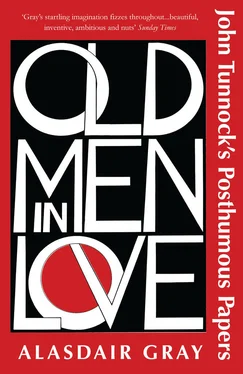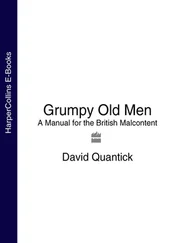This start of Starky’s sermon blended ideas he had heard from Henry with ideas from the notes he no longer used, but all were strongly combined and fluently uttered. The Spirit possessing him did not rave or shout, it spoke of Heaven solemnly yet joyfully, and spoke of Hell with such pity and distress that men hearing him dropped their heads upon their chests or gaped, amazed, at sobbing wives. Most women wept and one or two shrieked. Children clung to each other. Starky’s wife and sister and all who attended the evening prayer groups looked up to their rector with tears of joy while Henry, at the pulpit foot, smiled with calm satisfaction. A deep silence following the sermon was broken by a choirboy in the gallery suddenly guffawing until the bassoonist clouted his ear. Starky ended the service with a calm, firm authority he had never before shown.
Rector and curate retired to the vestry and gazed at each other for a moment before disrobing.
“You are now a mouthpiece of Almighty God, Brother Starky. Your trumpet blast is the opening of a new spiritual era.”
“You were right, master! You were right! The Spirit at last descended,” said Starky happily.
“You must not call me master, Brother Starky — only Christ is our master.”
“Yes but — please forgive me! — brother places us on an equal footing. I am not, I cannot be on an equal footing with you. It would be falsehood for me to pretend to it my dear, dear master.”
Henry brooded a little then smiled and said, “Call me Belovéd.” “O I will,” whispered Starky, “ I will.”
A very happy group returned to the rectory through a crowd of awe-struck gazers.
“Yes, we will all call you Belovéd, Brother Henry,” said Julia, “Won’t we dear?”
Mrs Starky could only nod, being too happy to speak.
From now on Starky conducted Sunday services without faltering. Those who had come from other parishes to mock him no longer came, some who had come out of mere curiosity remained to pray. His sermons never again caused such wild reactions as that first and most inspired one, but his congregation remained large, and interested with many who responded fervently to the services. On the following Sunday he announced that our Belovéd Brother Henry Prince had been directed by the Lord to say, that if any persons would send their children to the schoolroom later that evening, he would lecture to them. About fifty came. In a pamphlet published in 1842 — The CHARLINCH REVIVAL or, an Account of the Remarkable Work of Grace which has lately taken place in Somersetshire — Henry described what happened in the schoolroom:
The words spoken were at first very solemn, but in a few minutes the Holy Ghost came on the minister with the most tremendous power, so that the word of the Lord was really like fire. About twenty of the children were pierced to the heart, and appeared to be in great distress, but the bigger boys still continued unmoved, and some of them even seemed disposed to laugh. In a short time however the word reached them, too, and they were smitten to the hearts with the most dreadful conviction of their sin and danger: it appeared as if the arrows of the Almighty had pierced their very reins. In about ten minutes the spectacle presented by their schoolroom was truly awful: out of fifty children present there were not as many as ten could stand upright: boys and girls, great and small together, were either leaning against the wall quite overcome by their feelings of distress, or bowed down with their faces hidden in their hands and sobbing in the severest agony. For some time after the minister ceased to pray, they continued where they were, not weeping, but literally deeply wailing. They expressed their desire henceforth to forsake their sins and pleasures, and seek the Lord.
It would be impossible to express in words, the awful sense of God’s presence and power felt by those who were in the schoolroom on that occasion. Four or five obtuse ploughboys were sobbing as though they had the hearts of women. Three of those most deeply smitten were hardened reckless boys, whom the minister had been obliged long before to turn out of the school, after which they used to come to the church and sit opposite the minister, and make faces at him as he was preaching the most solemn and affecting truths. Often he looked from his pulpit on these boys where they were grinning at him, and said in his heart, “What can God bring these boys here for? Surely he cannot intend to convert them.” Now only one was altogether unaffected: this boy stood upright, with a vacant stare of stupid astonishment on his face, in the midst of the children who were weeping around him, as though God had permitted him to come there to contrast between one on whom the word did not take affect, and on those whom it did.
Henry’s prayer meetings for adults in the rectory were often as passionate for he could be eloquent, with small, willing audiences.
After a sermon in December that year Starky made a peculiar announcement: “Christmas is nearly upon us — a joyful yet solemn time for all true Christians mindful of our Saviour’s coming, and who are willing to receive him. Our Belovéd Brother Prince and I will conduct the Christmas Eve service with prayer, fasting, exhortation and psalms from six o’clock to midnight, and the Christmas Day service, along with Holy Communion, from nine in the morning till nine in the evening, or later, if the Spirit so wills. We realize this will not please a majority who regard the Christmas Holy-Days, alas alas alas! as an opportunity to eat, drink and be merry, and the Yuletide services as pauses for digestion before again joining the revels. We do not wish those who view Christmas in that light way to attend our services. The time has come to make a separation between the concerned and the careless, the wheat and the chaff, sheep and goats. For three months God has been calling the faithful of this parish to him. A great many have answered that call and, though not yet converted, are struggling along the pathway to conversion. These will be heartily welcome. Our Christmas services can do the rest of you no possible good so please do not attend.”
Before most of his hearers had grasped the sense of this announcement he resumed the words of the prayer book, praying that, “At Christ’s second coming to judge the world, all present will be found an acceptable people, in the sight of Him who lives and reigns with the Father and the Holy Spirit, ever one God, world without end, Amen. O God, our Father in Heaven; have mercy upon us miserable sinners.”
Roughly half the congregation repeated the response to that while a few started whispering and buzzing. Speaking louder to overcome their noise he cried, “O God the Son, Redeemer of the world; have mercy upon us miserable sinners.”
The buzz became a clamour as many protesters stood up, looked round and spoke to each other. Starky shouted, “O God the Holy Ghost. .” before his voice was drowned by uproar. The concerned part of his congregation stayed kneeling and responding so loudly that their voices almost overcame the tumult of the rest and certainly greatly increased it.
So in Charlinch Church in 1841 Christmas Day was celebrated exactly as the rector and his curate wished, and as Henry later described it: The whole body of believers spent this day in fasting and prayer. It was a blesséd day: twenty-six believers, unaccompanied by any of the unconverted, met at the Lord’s table, and truly, the Lord Himself was present with them. The King sat at His table, a soft and loving Spirit pervaded all the people, and the Spirit knit all their hearts together into one. Can anyone resist the conviction that this is God’swork? If it be not His, whosework is it?
Читать дальше












